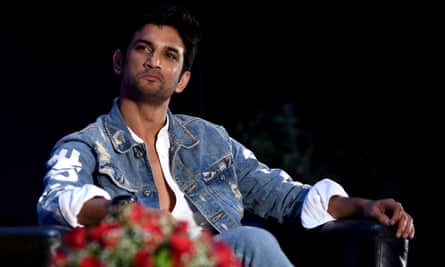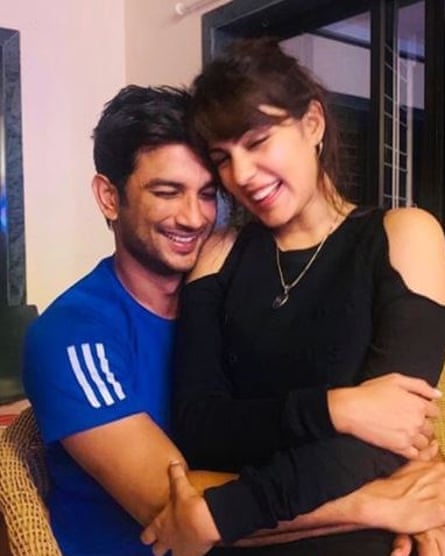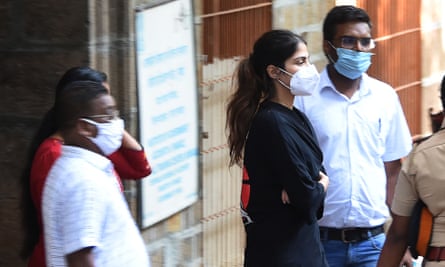
Sushant Singh Rajput was found dead on 14 June. Police ruled he had killed himself. Photograph: Sujit Jaiswal/AFP/Getty
Bollywood star’s tragic story has spiralled into a national obsession, with his girlfriend at its centre

For 90 days, the death of a young Bollywood star has transfixed India.
The story that began in June, when the actor Sushant Singh Rajput was found dead in his Mumbai apartment, was initially one of grief and tragedy. Police ruled that he had killed himself.
Yet the spectacle it has morphed into since – involving misogyny, drugs, money, media witch-hunts, feuds, police leaks, federal investigations, state elections and the arrest of a Bollywood star – has become an unprecedented national obsession, with everyone from senior politicians to Amnesty International wading in.
To outsiders, Rajput seemed to have everything to live for. Born into a poor household in the deprived state of Bihar, he had worked his way up through Bollywood over seven years and starred in six hit films including MS Dhoni: The Untold Story, in which he played the legendary cricketer, and his most recent box-office success, the comedy Chhichhore.
But behind the scenes his mental health had begun to deteriorate, according to a close family friend of his girlfriend, Rhea Chakraborty. During a trip to Europe with Chakraborty last autumn, he began to suffer manic episodes and fell into a deep depression, leading them to return to India early.

Sushant Singh Rajput and Rhea Chakraborty. Photograph: Instagram Rhea Chakraborty
The couple withdrew from the public eye, fearful that if Rajput’s mental illness became widely known it would end his career. In January Chakraborty confided to the friend, who does not want to be named, that he had been given a range of diagnoses, from manic depression to schizophrenia, and eventually bipolar disorder.
“Rhea did everything she humanly could for Sushant, and every time he had a good day, she would call me up, so excited and determined she could help him beat this,” said the friend. “He moved into her family house and they looked after him like he was their own child. He did not feel like his own family really understood his mental illness.”
On 14 June, Rajput, 34, was found dead.
Mumbai police began investigating his death as a suicide. However, public speculation grew around the case when the actor Kangana Ranaut, known for her pro-government leanings, took to social media to blame nepotism and certain Bollywood elites for driving him to his death. She alleged that they had ostracised Rajput, attempted to sabotage his career and prevented his films from being released because he did not come from “pure” Bollywood lineage.
The media, already whipped up into a frenzy over the Bollywood mudslinging, were fuelled further when 10 days later Rajput’s father filed a police complaint against Chakraborty and three of her family members. The complaint accused her of abetment to suicide, stealing millions of his money, as well as denying that Rajput had suffered from depression.
In interviews, Chakraborty dismissed the allegations as “baseless” and “pathetic”, but as demand grew to assign blame for Rajput’s death, so too did an apparent witch-hunt. As public pressure increased, in mid-August the supreme court stepped in and ordered the Central Bureau of Investigation to open an investigation into his death, defying legal precedent in the process.
On rightwing TV channels sympathetic to the government, the case has become an obsession that knocked India’s record-breaking coronavirus infections, China’s aggressions at the border and the worst quarterly economic recession since records began off the news agenda.
Reporters camped outside Chakraborty’s and her family’s houses, confronting her as she left her home. Online, she has been bombarded with accusations of being “manipulative”, a “gold-digger” who got Rajput addicted to drugs, and “sex bait” who “performed black magic” to drive him to his death.
“The campaign to bring down Rhea and blame her for the death of Sushant in the name of justice has been a surreal, shocking and hysterical witch-hunt, driven by misogyny, the strength of public voyeurism and TV ratings points,” said the actor Swara Bhaskar. “She had already been declared guilty by a media trial and so it feels like the agencies had to come up with any reason to arrest her.”
Rajput’s therapist even took the unusual step of speaking publicly about him, explaining he had suffered from bipolar disorder and depression, and that Chakraborty had been a crucial source of support for him.
Critics say the magnification of Rajput’s case, in particular the decision by the supreme court to approve a federal investigation into his death, appears to have been driven by a realisation that it could be used as lucrative political capital.
Rajput is from Bihar, a BJP state that next month will hold tightly contested elections, and “justice” for his death is being used as an emotive election issue by the BJP. In Bihar, the party is distributing 30,000 stickers and posters and 30,000 face masks with Rajput’s face printed on them, with the slogan: “We have neither forgotten nor will let one forget Sushant,” alongside the BJP logo.
Anna MM Vetticad, a journalist and author, noted the irony of the BJP positioning itself as a champion of justice for Rajput.
“The BJP and its supporters had viciously attacked the actor’s films in his lifetime for promoting Hindu-Muslim amity and for featuring Hindu-Muslim romances, at one point turning their wrath on Sushant himself when he publicly condemned extremism from the powerful Rajput community to which he belongs,” said Vetticad. “In the din surrounding Sushant’s death, political opportunists have sought to erase this inconvenient aspect of his legacy while they appropriate him for their own ends.”

Rhea Chakraborty is taken into custody by the Narcotics Control Bureau. Photograph: Bhushan Koyande/AFP/Getty Images
The allegations that Chakraborty had abetted Rajput’s suicide and stolen his money are unsubstantiated, yet last Sunday she was summoned to the Narcotics Control Bureau (NCB) over further allegations that she had procured cannabis for Rajput, on the basis of WhatsApp messages. On Tuesday, on her third visit for questioning, she was arrested. The NCB asked the court to detain Chakraborty in judicial custody without bail, describing her as part of an “active drug syndicate”.
As she entered the NCB office to be placed under arrest, the message on Chakraborty’s T-shirt sent a clear message: “Roses are red, violets are blue, let’s smash the patriarchy, me and you.”
The supreme court lawyer Karuna Nundy criticised the investigation into Chakraborty as a “fishing expedition”, and said her subsequent arrest was “mainly to satisfy a manufactured public bloodlust before the Bihar elections”.
“This is a fascist cocktail of media, politics and the misuse of legal machinery,” said Nundy. “It’s a Wag The Dog style of creation of spectacle to take eyeballs away from the economy, which has shrunk by 24% in the last quarter, and Covid mismanagement. Both of which would otherwise be disastrous for the ruling party.”
